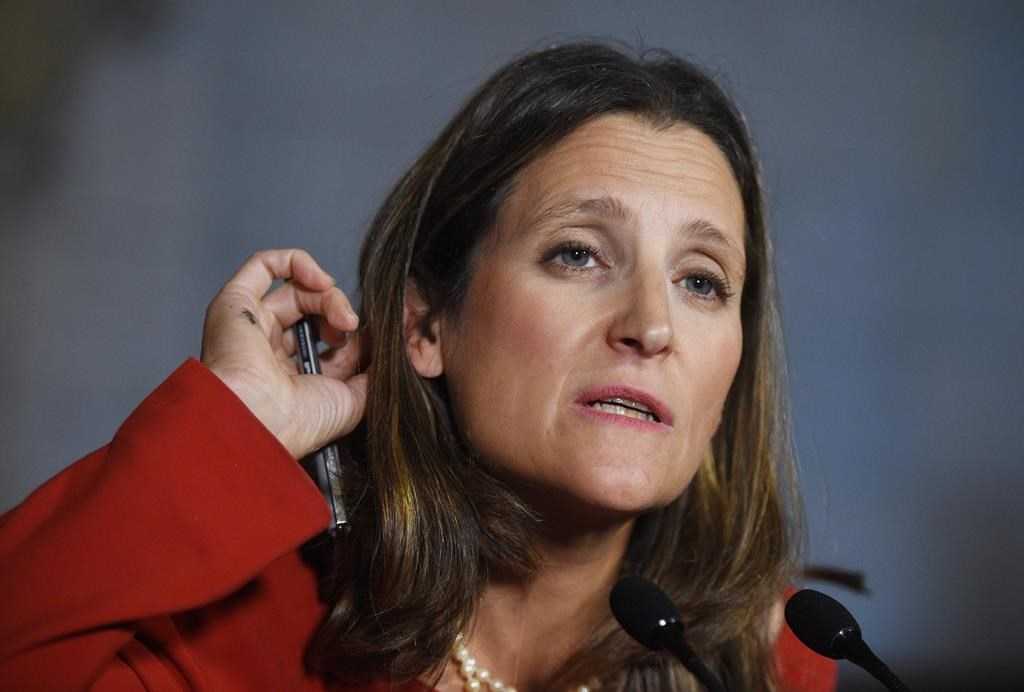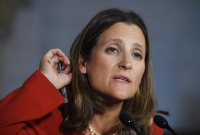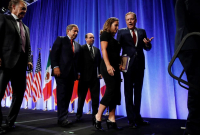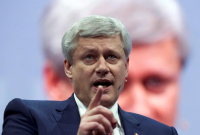Support strong Canadian climate journalism for 2025
The Trudeau government knows other countries are raising their eyebrows at the thought of feminist trade deals, but the Liberals are convinced the idea will one day be as obvious as labour and environmental standards are today.
That is one of the messages Canadian negotiators have been using to try to convince the United States and Mexico to include a gender chapter in the new North American Free Trade Agreement, newly released briefing materials show.
"Think back 20 years and remember the early discussions of labour and environment in the context of trade agreements," said talking points prepared for senior bureaucrats at Global Affairs Canada ahead of negotiations that began Aug. 16 in Washington, D.C.
"Some recognized a link and a need to address some issues inside trade agreements. Others didn't," said the document. "The creation of co-operative mechanisms increased our understanding of these issues and demonstrated the need for appropriate obligation in trade agreements."
The Canadian Press obtained the records through the Access to Information Act.
Even Canadian officials were skeptical at first, the documents suggest.
"Our first reflex was to say that (free trade agreements) are gender-neutral," said the document. "But are the effects gender-neutral? We began to realize that not all are."
Only one in five exporting firms is led by a female entrepreneur, the document points out, along with research from the World Bank that showed a vast number of countries do not give women the same legal rights as they do men when it comes to doing business.
The documents also note Prime Minister Justin Trudeau and U.S. President Donald Trump have come together on this issue before, when the Liberal government — helped along by Trump's daughter and adviser Ivanka — managed to engage with the White House on the issue of women at work.
Besides, the documents argue, such an approach could help build support for the deal at a time when people around the world have been increasingly rejecting the notion that free trade is good everyone.
"The Trade and Gender chapter will also be an important signal to demonstrate that making economic growth more inclusive is an important objective of the NAFTA modernization . . . and an important means by which to generate support for the final outcomes," it said.
It remains unclear whether the proposed gender chapter will survive, as U.S. officials have been described as showing less enthusiasm than others when negotiators devoted half a day to the issue during the most recent round of talks in Mexico City.
Angella MacEwen, a senior economist with the Canadian Labour Congress, said that does not mean gender equality would be absent from the deal.
"I'm not holding out an expectation that there will be a gender chapter in an eventual NAFTA, but I do think they have added a gender lens to other chapters and that is useful," said MacEwen.
That includes the labour chapter, where Canada has proposed language on things like pay equity and child care in the preamble, although they are not hard obligations.
The Liberals also believe pushing for gender to be included in some way in NAFTA, much as they worked to incorporate more progressive elements in the Canada-EU Comprehensive Economic and Trade Agreement (CETA), would set a standard for future trade deals too.
Alex Lawrence, a spokesman for Foreign Affairs Minister Chrystia Freeland, said Ottawa remains committed to including gender in the new NAFTA.
"With respect to trade agreements, the gold standard now needs to include a gender chapter," he said in an email.
Several sources both in and outside of government said the proposed text is modelled after the gender chapter the Liberal government added to its free trade deal with Chile.
That pact, which was only the second in the world, had both countries agree that working to include women and girls is key to long-term economic development and reaffirm their commitment to international agreements on gender rights.
It also made clear that nothing in the gender chapter could be subject to the dispute resolution mechanism that applies to the rest of the trade deal.
The documents suggest the Liberal government is aware this could open them up to criticism, as one of the charges against the side deal on labour that accompanied the original NAFTA was the toothless language on non-discrimination.
"These measures are non-enforceable and have faced criticism over the years for not meaningfully addressing concerns," said a heavily redacted memo on the issue, previously classified as secret, released alongside the talking points.





Comments